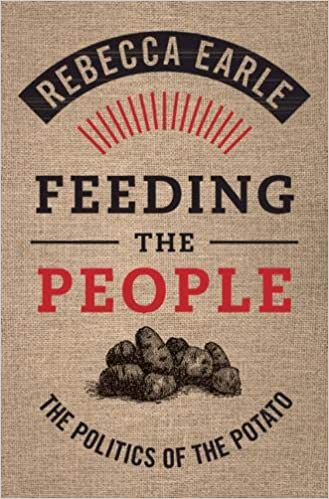You must be logged in to post a review.
Feeding the People: The Politics of the Potato
Feeding the People the Politics of the Potato by Rebecca Earle is about the development, history, and spread of the potato. From its beginnings in the Andes to a worldwide food source, this is a dynamic story. The author does a scholarly exploration of how the fortunes of the potato have risen and fallen with the fortunes of enlightened, despotic, subversive, or desperate nations. Potatoes are easy to grow, therefore it sneaked into gardens of common people, unnoticed by the seeking eyes of the tax collectors. Until they noticed it. Nations saw how strong enemy armies, who subsisted on potatoes, had become. Needing strong well nourished soldiers, whether to fight Napoleon, the Kaiser, or Hitler, the British government was motivated to push the cultivation and eating of potatoes as a patriotic duty. Starvation and poverty motivated the Irish to plant potatoes in every plot. Concern for the benighted masses energized enlightened thinkers to push for societal utopia by extolling the virtues of potato eating. Opposite those positives are the historical famines of counting too much on even the potato, the perception that only poor would eat them, and the general distrust of doing anything any government propagandized as good.
This is a well documented work with several old prints emphasizing the authors points. It even has historical to modern recipes of potato dishes. At the end we are left with the uncomfortable thought that governments are still pushing potatoes, nutritionists are out of favor with the potato, for whatever reason, and most people still eat potatoes because they like them, regardless of government, popularity, or history.
| Author | Rebecca Earle |
|---|---|
| Star Count | /5 |
| Format | Hard |
| Page Count | 306 pages |
| Publisher | Cambridge University Press |
| Publish Date | 2020-07-01 |
| ISBN | 9781108484060 |
| Bookshop.org | Buy this Book |
| Issue | November 2020 |
| Category | History |
| Share |






Reviews
There are no reviews yet.